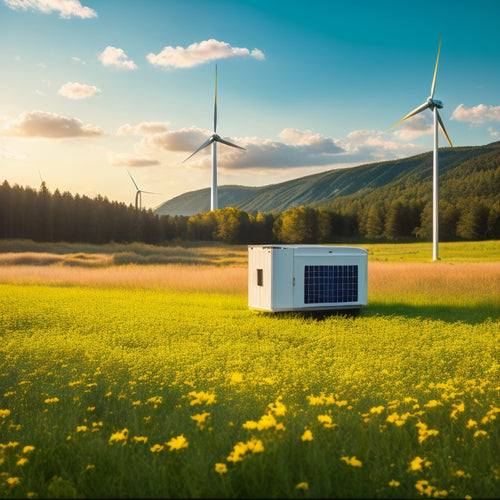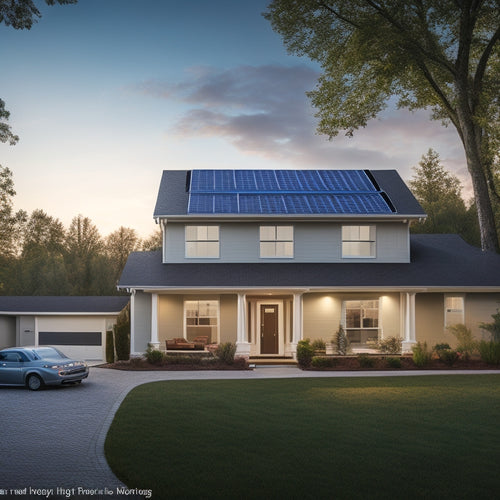
Solar Panels for Small Cabin
Share
By incorporating solar panels into your small cabin's energy strategy, you can break free from reliance on the grid, minimize your carbon footprint, and enjoy a sustainable, renewable energy source that's customized to your unique off-grid needs. With decreasing costs, solar panels are now more accessible, allowing you to reduce your energy bills by 50% or more. To optimize energy harvesting, consider factors like panel orientation, energy storage, and monitoring systems. As you investigate the world of off-grid energy independence, you'll uncover key considerations for evaluating your energy requirements, optimizing energy production, and maneuvering shade-tolerant panel designs, ultimately leading you to a path of true energy self-sufficiency.
The Essentials
- Solar panels provide a clean, sustainable energy source for small cabins, reducing reliance on the grid and minimizing carbon footprint.
- Off-grid solar kits address high energy costs, noise, and limited access, ensuring a consistent energy supply even in remote locations.
- Battery storage systems and energy monitoring optimize energy usage, allowing for true energy independence and significant energy savings.
- Correctly sizing the solar panel array and battery bank is crucial for ensuring a reliable energy supply, considering daily power demands and usage patterns.
- Shade-tolerant panel designs and experienced installers can minimize shading effects and ensure optimal performance, even in low-light conditions.
Off-Grid Energy Independence Guaranteed
When you opt for solar panels on your small cabin, you're tapping into a renewable energy source that's clean and sustainable.
This setup allows you to operate in energy self-sufficiency mode, reducing your reliance on the grid and minimizing your carbon footprint.
By choosing an off-grid solar kit, you can solve three major problems that come with relying on the grid or generators: high energy costs, noisy and polluting fuel-based systems, and limited access to power in remote areas.
Renewable Energy Source
By utilizing the power of solar energy, you can break free from reliance on traditional grid electricity and secure a reliable, renewable energy source for your small cabin.
This shift towards renewable energy trends not only reduces your carbon footprint but also provides a sustainable solution for your energy needs.
One of the significant solar panel benefits is the ability to generate electricity independently, reducing your reliance on external power sources.
By embracing off-grid solar solutions Renewable Energy Systems, you can enjoy uninterrupted power supply wherever you are.
As you adapt to a renewable energy source, you'll notice a significant decrease in your energy costs.
Solar panels can provide a consistent and predictable energy supply, even in remote areas with limited access to traditional grid electricity.
With the rising demand for renewable energy, the cost of solar panels has decreased, making it a more accessible option for small cabin owners.
Energy Self-Sufficiency Mode
You've taken the first step towards energy independence by opting for a renewable energy source, and now you're ready to take it to the next level with an Energy Self-Sufficiency Mode. This mode allows you to disconnect from the grid and rely solely on your solar panels for power.
To achieve this, you'll need a sturdy battery storage system to store excess energy generated during the day for use at night or during periods of low sunlight. Many homeowners and businesses are keen to break free from the constraints of traditional grid-based energy and tap into the power of the sun, but they often struggle with the complexity and uncertainty of designing and installing a dependable off-grid solar system off grid solar power systems.
A reliable energy monitoring system is also essential to track your energy production and consumption in real-time. This will enable you to optimize your energy usage, identify areas of inefficiency, and make adjustments as needed.
With Energy Self-Sufficiency Mode, you'll have complete control over your energy needs, reducing your reliance on the grid and giving you the freedom to live off the land. By combining solar panels with battery storage and energy monitoring, you'll be able to enjoy true off-grid energy independence, free from the constraints of traditional power sources.
Zero Energy Bills Guaranteed
You'll enjoy significant energy savings assured when you install solar panels on your small cabin, which translates to zero energy bills.
By opting for a complete solar power solution off grid energy solutions, you can guarantee a self-sufficient solar system that meets your energy needs.
This setup guarantees you're not reliant on the grid, reducing your carbon footprint and minimizing your impact on the environment.
Energy Savings Guaranteed
Several small cabin owners who've installed solar panels are already reaping the benefits of markedly reduced energy bills, with many even achieving zero energy bills.
As you consider joining their ranks, you're likely wondering what kind of energy savings you can expect. The good news is that solar panels offer significant cost benefits, and the installation process is more streamlined than ever.
With solar panels, you'll generate your own clean energy and reduce your reliance on the grid. This means you'll be shielding yourself from rising energy costs and enjoying a significant decrease in your monthly bills.
In fact, many cabin owners have reported a reduction of up to 50% or more in their energy expenses. Furthermore, with the current federal tax credit, you can claim up to 26% of the total installation cost as a credit on your taxes.
Reduced Carbon Footprint
By opting for solar panels, you're not only slashing your energy bills but also drastically reducing your carbon footprint. This is a significant step towards embracing sustainable practices and contributing to a cleaner environment.
With solar panels, you'll be generating clean energy, which means you'll be offsetting the carbon emissions produced by traditional energy sources. This carbon offset directly translates to a reduced carbon footprint, giving you a sense of freedom from reliance on non-renewable energy sources.
As you invest in solar panels for your small cabin, you'll be joining the league of eco-conscious individuals committed to reducing their environmental impact. By utilizing the power of the sun, you'll be minimizing your reliance on fossil fuels, which are a significant contributor to greenhouse gas emissions.
This conscious decision won't only benefit the environment but also contribute to a healthier planet for future generations. By choosing solar panels, you're taking a significant step towards a more sustainable future, and that's a freedom worth fighting for.
Maximum Power Point Tracking
You'll want to guarantee your solar panel system incorporates Maximum Power Point Tracking (MPPT) to optimize energy harvesting, especially when considering off-grid living and rural solar power for your cabin.
This technology is essential for remote off-grid energy solutions. MPPT technology continuously monitors and adjusts the system's operating voltage to match the maximum power point, allowing for efficient power conversion.
Optimizing Energy Harvesting
Utilizing maximum energy from your solar panels is essential for powering your small cabin efficiently. To achieve this, you need to enhance energy harvesting, which involves maximizing the energy output from your solar panels. This is where Maximum Power Point Tracking (MPPT) comes in.
MPPT is a technique used to enhance energy harvesting by tracking the maximum power point of your solar panels, guaranteeing you get the most energy possible.
When it comes to enhancing energy harvesting, panel orientation is significant. The ideal orientation for your solar panels depends on your location and the time of year. In general, a south-facing orientation with a tilt angle equal to your latitude is ideal.
Additionally, energy storage plays an important role in enhancing energy harvesting. By storing excess energy generated during the day, you can use it to power your cabin at night or during periods of low sunlight.
Efficient Power Conversion
To optimize energy harvesting, you've assured your solar panels are oriented correctly and excess energy is stored for later use.
Now, it's time to focus on efficient power conversion, a vital aspect of your off-grid system. Maximum Power Point Tracking (MPPT) is a significant technology that guarantees your solar panels operate at their maximum potential.
MPPT controllers continually monitor the solar panel's voltage and current output, adjusting the converter's operating point to maximize energy production. This sophisticated technology optimizes energy conversion efficiency, allowing you to utilize the most power from your solar panels.
By leveraging advanced power conversion technologies, you can increase your energy yield by up to 30%. This translates to more power for your small cabin, reduced reliance on traditional energy sources, and a greater sense of freedom.
With MPPT, you can rest confident that your solar panels are working efficiently, providing you with a reliable and sustainable source of energy.
Assess Your Energy Requirements
You need to understand your energy usage patterns to determine how much power your cabin requires.
As you assess your energy needs, consider investing in a reliable backup power solution, such as a home energy storage system, to guarantee continuous energy supply during outages.
To do this, calculate your daily power demands by identifying the appliances and devices you'll be using, their wattage, and the number of hours they'll be in operation.
This will help you determine the total watt-hours your solar panel system needs to provide per day.
Energy Usage Patterns
Your small cabin's energy usage patterns are essential in determining the size and number of solar panels you'll need to install. To accurately assess your energy requirements, you'll need to understand your energy consumption and usage trends. This involves analyzing your daily habits, appliances, and devices that consume power.
For instance, do you use energy-efficient LED bulbs or traditional incandescent ones? Do you have a refrigerator, freezer, or other appliances that run continuously? Identifying these factors will help you determine your peak energy consumption periods and overall energy usage.
You'll also want to take into account seasonal variations in your energy usage. Do you use more energy during winter for heating or summer for cooling? By understanding these patterns, you can design a solar panel system that meets your energy needs throughout the year.
Additionally, you may want to think about investing in energy-efficient appliances and devices to reduce your overall energy consumption. By doing so, you can minimize the size and number of solar panels needed, making your off-grid energy system more efficient and cost-effective.
Daily Power Demands
Energy audits reveal that daily power demands are a vital aspect of determining the required solar panel capacity. To assess your energy requirements, you need to calculate your daily power consumption. This involves identifying the appliances and devices you'll use in your small cabin and their respective power ratings.
Make a list of everything that consumes power, from lights and refrigerators to laptops and smartphones. Next, estimate the daily usage hours for each device. This will help you determine the total daily power consumption in watt-hours (Wh).
For example, if you have a 10W LED light that's used for 8 hours a day, its daily power consumption would be 80Wh. Add up the daily power consumption of all devices to get your total daily energy requirement.
Effective energy management is essential to optimize your solar panel system's performance. By understanding your daily power demands, you can size your solar panel array and battery bank correctly, ensuring a reliable and sustainable source of energy for your off-grid cabin.
Higher Efficiency in Shade
When you're installing solar panels on your small cabin, you'll likely encounter shaded areas that reduce energy production.
To mitigate this, you should look for shade-tolerant panel designs that can optimize energy output even in low-light conditions.
Shade-Tolerant Panel Designs
Many small cabin owners face the challenge of limited sunlight due to surrounding trees or structures, which can greatly diminish the efficiency of traditional solar panels. To combat this, you can consider installing shade-tolerant panel designs that maximize energy production even in partial shade.
These innovative designs prioritize higher efficiency in shade by incorporating state-of-the-art technologies such as bifacial panels, half-cut cells, and shingled arrays.
When selecting shade-tolerant panels, you'll want to evaluate their panel aesthetics to guarantee they seamlessly integrate with your cabin's design. Look for sleek, durable designs that withstand harsh weather conditions.
Additionally, consider the installation techniques employed by your chosen installer. Verify they've experience with complex installations and can optimize panel placement to minimize shading effects.
Shade-tolerant panel designs can considerably enhance your energy output, even in shaded areas. By investing in these advanced technologies, you'll be able to utilize more energy from the available sunlight, ultimately increasing your cabin's energy independence.
Frequently Asked Questions
Can I Install Solar Panels on a Metal Roof?
You can install solar panels on a metal roof, but make certain the metal roof installation meets solar panel compatibility requirements, such as a structurally sound roof, suitable roofing material, and proper sealing to prevent water infiltration.
Do Solar Panels Work During a Power Outage?
Darkness falls, yet you're lit up, thanks to solar panels. During a power outage, they won't provide energy to your home unless you have a battery storage system, granting you energy independence when the grid fails.
Are Solar Panels Resistant to Hail and Extreme Weather?
You'll find that solar panels are designed to withstand extreme weather conditions, including hail damage; they're built with weather resilience in mind, so you can rely on them to generate power even in harsh environments.
Can I Expand My Solar Panel System in the Future?
You can easily expand your solar panel system in the future by evaluating your current system capacity and anticipating future needs, then adding more panels or upgrading components to meet your growing energy demands.
Do Solar Panels Require Regular Maintenance?
You might think solar panels are high-maintenance, but they're not! You'll simply need to clean them seasonally and perform routine inverter maintenance to guarantee peak energy production, giving you the freedom to enjoy reliable, renewable energy.
Final Thoughts
You've made the smart decision to go off-grid with solar panels for your small cabin. Now, you're guaranteed energy independence and zero energy bills. With maximum power point tracking, you'll utilize every available watt. By evaluating your energy requirements, you've optimized your system for maximum efficiency. And, thanks to higher efficiency in shade, you'll still generate power even on cloudy days. So, what's stopping you from basking in the freedom of renewable energy?
Related Posts
-

Sustainable and Eco-Friendly Generators for a Reduced Carbon Footprint
Sustainable and eco-friendly generators are perfect for cutting your carbon footprint and increasing energy efficienc...
-

Cost of Solar With Battery Backup
You're investing in a solar panel system with battery backup to guarantee reliable power during outages. The cost of ...
-

Designing a Green Roof for Maximum Energy Efficiency
Designing a green roof for maximum energy efficiency involves several key strategies. Start by selecting native, drou...


